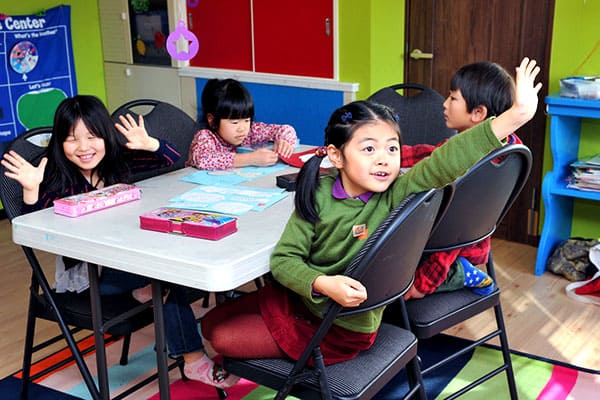Kobe Bilingual School
HOME | KINDERGARTEN | ELEMENTARY | SUBJECTS | FAQ | COMPARISON | FEATURES | FEES
Special Features of KOBILS:
Mixed grade classes: Children are placed in mixed grade classes across 2-3 grade levels for homeroom and other subjects. The social studies, arts, ethics and life skills classes spiral content throughout the years and children are encouraged to produce work and projects for each subject at their own unique level; the topic and theme is the same, but the interpretation reflects each child’s interests and ability. Children are encouraged and motivated to progress.
Level specific learning in English, Japanese and Math
Children join a group appropriate to their level and learning style, so they can make maximum progress.
Attention to both languages
English immersion with Japanese taught too. The minority language (English in most cases) is prioritised in Kindergarten and the early grades, and then decisions made about specialisation or balanced bilingualism from grade 4.
Aspects of the Japanese education system in an international school context
Not only do we teach Japanese in “Kokugo” (Japanese lessons), incorporate some of the social studies curriculum, and teach pianica in music class, we also serve “kyushoku” or school lunch. “Kyushoku” is a Japanese style freshly prepared meal with lots of vegetables offering a nutritionally balanced diet. Children assist with serving lunch in a Japanese style and learn about exactly what is in their lunch and how it benefits them. KOBILS also has a short time at the end of the day for classroom cleaning.
Life skills curriculum: Finance and practical life skills
Life skills teaches the children personal finance and other practical life skills. KOBILS children must open a post office account in their first year and parents budget ¥18,000 for use during the year. Children learn how to pay the money into the post office and how to manage their money through ATM withdrawals and Internet banking. They budget money for spending on family birthdays and events, invest some money in a “business” which they develop and run throughout the year as they attempt to make money, and contribute to a charity. In addition, cooking, washing clothes, using tools to put together simple furniture and learning about maintaining a household is included in the life skills curriculum. Children are also given jobs around the school – from helping serve lunch to basic cleaning and maintenance.
Plenty of time for play, the arts and cross-curricular projects
Long lunch breaks and recess in the afternoon, Dance in PE, music and arts and crafts are given several curriculum hours so that children can receive a wide and balanced education. KOBILS believes that free play and organised play are vitally important and time spent on these activities nourishes bodies and minds and actively builds brains.
With external Instruction in PE and dance, KOBILS brings local experts to the classroom.
Coordinated Curriculum from kindergarten – Grade six
Children begin the CfE curriculum in Kindergarten with all subject areas provided for albeit in a somewhat looser and more cross curricular way during the kindergarten years. KOBILS has a separate Kindergarten in a mountainside location in Higashi-Tarumi, west of Shioya which allows for lots of outside play and enjoyment of nature in the years preceding the start of compulsory education in Japan.
Curriculum Review
Children end each week with an opportunity to discuss and review their week in their native language (for Japanese and English and wherever possible in other languages). This opportunity helps solidify learning, demystify and learn important subject specific vocabulary in their own language (in cases where this is not English) and It also forms important pastoral care with the children able to give feedback and express concerns about their progress.
School year starts in April
The school year follows the Japanese system and starts in April. Children turning 6 before April 1 each year may join grade 1. Children not yet 6 by April 1 may join kindergarten. International children who turn 6 between April and September may join grade 1 in April if they are developmentally ready. Kindergarten starts in the year following the child’s third birthday for three years.
Technology is integrated across the curriculum
Children starting at Momo Park must have an iPad. Technology is taught in a separate IT class and integrated across the curriculum with APPs and online materials available for use in most curriculum areas.
Morning club and after school daycare for children of working parents
Children from 3 years old can join us from 7:30 and until 18:00 (18:30) if parents are working, or just for fun (priority is given to children of working parents). With a nutritional hot lunch and a snack in the afternoon, Afterschool classes are topic based on a daily basis so children can learn more about science, do projects, learn more music and dance, and get more support for literacy with a healthy dose of free play too.
Extensive reporting of progress / opportunities for communication
The school is always open for drop-by visits; our curriculum has extensive “can do statements” which tell you in easily understandable language what your child is working on, and how they are progressing. We have observation day every term and parent/teacher meetings. We also have a private Facebook page where we post photos every week that show what the children are doing at school. You can always reach us for feedback, if you have suggestions or concerns or just for a chat, either face-to-face or by filling out our feedback form online.
HOME | KINDERGARTEN | ELEMENTARY | SUBJECTS | FAQ | FEATURES | FEES


